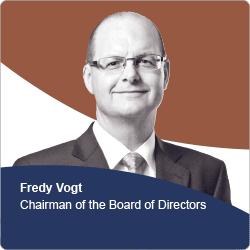Statement by the Chairman of the Board and the Chief Executive Officer
Dear Shareholders,
Ladies and Gentlemen
In 2014, the implementation of our main goals – focusing on clients and distribution, ensuring more efficient market development and taking advantage of growth opportunities – occurred in an environment heavily influenced by central bank policies. Low inflation and fragile economic growth made continued loose monetary policy necessary. The central banks have established important cornerstones that also have an impact on VP Bank’s performance. The 2014 results must be measured against this background.
Annual results
In 2014, VP Bank Group recorded a Group net income of CHF 20.0 million, down from CHF 38.7 million the previous year. This decline was caused by the continuing fall in Swiss franc bond yields, which led to unrealised losses on interest rate hedges. Adjusted for these unrealised losses, the Group’s 2014 net income was CHF 36.0 million (compared with CHF 30.1 million in 2013 after adjusting for gains on interest rate hedges).
Adjusted for the impact of interest rate hedging transactions, gross income and operating income both increased. Operating expenses fell by 1.6 per cent to CHF 165.3 million thanks to active cost management.
Assets under management rose by a satisfactory 1.8 per cent from CHF 30.4 billion to CHF 30.9 billion. Client assets again came under intense pressure because of the tax issue. In 2014, VP Bank Group recorded a CHF 850 million net outflow of client assets, compared with a net inflow of CHF 965 million the previous year (including the asset deal with HSBC Trinkaus & Burkhardt (International) SA in Luxembourg). Thanks to successful market development efforts, VP Bank was able to limit the net outflow of client assets in its existing business. However, the inflows generated were not sufficient to offset the outflows of assets under management. As a result of the merger with Centrum Bank, VP Bank Group will record substantial client asset inflows.
Proposed dividend
At the annual general meeting on 24 April 2015, the Board of Directors will propose a dividend of CHF 3.00 per bearer share (previous year: CHF 3.50) and CHF 0.30 per registered share (previous year: CHF 0.35). The proposed dividend reflects the dividend policy adopted by the Board of Directors, namely to pay out between 40 to 60 per cent of total net income to shareholders, provided that the Bank’s medium-term tier 1 capital ratio exceeds the target of 16 per cent. The goal is to maintain a steady dividend trend. The Board of Directors justifies its proposed dividend based on the net income adjusted for losses on interest rate hedging transactions of CHF 36.0 million.
Laying the groundwork
In 2014, VP Bank Group implemented a number of essential measures. The main measure, first announced in 2013, involved the establishment of an efficient management structure focused on clients and distribution. VP Bank is thereby more closely aligned with current market trends and client needs.
In early 2014, we established a streamlined Executive Board. The company structure was also optimised; it now consists of three business segments instead of four. The Executive Board of the Head Office in Vaduz now fulfils the Group Management function. More information is available in the section “The organisational structure of VP Bank Group”.
Strategic orientation and positioning
Independence and growth are the cornerstones of our strategic orientation. We strive to acquire new clients in our target markets and generate qualitative growth in assets under management. In 2014, we therefore set two key priorities.
In late 2013, we already moved to acquire the private banking activities of HSBC Trinkaus & Burkhardt (International) SA as well as the private banking related fund business of HSBC Trinkaus Investment Managers SA in Luxembourg. Since then, the integration of these businesses has been successfully completed at the technological, personnel and client levels. The acquisitions further strengthen VP Bank Group’s overall fund management capabilities.
The merger with Centrum Bank in Liechtenstein, which we announced in December 2014, represents another key priority. VP Bank Ltd acquired 100 per cent of the shares in Centrum Bank AG – at that time the fourth-largest financial institution in Liechtenstein – making it a wholly owned subsidiary. Given the respective business models with comparable core competencies, target markets and client structures, the conditions are ideal for us to successfully integrate the bank and generate substantial potential synergies. The acquisition includes client assets totalling CHF 7.1 billion (in early 2015).
In addition to these priorities, we stepped up our market development efforts at all of our sites. New client advisors and managers are supporting our experienced teams. One key task last year involved the process of transforming the banking business to make it fully transparent from a tax perspective. With the introduction of the automatic exchange of information in many OECD countries, all sites will have completed this process by early 2016 at the latest.
Ongoing efficiency gains
VP Bank Group is committed to enhancing productivity, reducing complexity and keeping down costs. The “Apollo” project is another key step in this process. It involves establishing a clear positioning in the private banking and brokerage business, optimising the product and service offers in the client segments and seeking out and maximising efficiency in the client advisory units. More information on these measures is presented in the section “Strategic orientation of VP Bank”.
Regulatory environment
According to a Reuters study, every internationally active bank must deal with 60 new regulatory requirements per day. Growing regulatory pressures also present a challenge for VP Bank Group in an environment marked by rising costs and shrinking margins.
In May 2014, Liechtenstein signed the Foreign Account Tax Compliance Act (FATCA) agreement with the United States. This agreement removes banking secrecy protection in Liechtenstein for US taxpayers. Pursuant to this agreement, Liechtenstein banks are required to pass information on US client accounts to the tax authorities.
The European Union’s updated Markets in Financial Instruments Directive (MiFID II) will be implemented in Liechtenstein as from January 2017. This directive is designed primarily to further strengthen investor protection. MiFID II will result in an overhaul of the investment advisory and asset management process as well as increased record-keeping and disclosure requirements.
In November 2013, Liechtenstein signed the Multilateral Tax Convention, which governs various forms of cooperation in tax matters, notably the sharing of information. Over the course of 2014, further efforts were made to enhance tax transparency at the international level. In the future, the myriad of bilateral and multilateral agreements will be replaced by a common standard for the automatic exchange of information.
Liechtenstein banks have adopted a common policy of minimum standards as regards due diligence to be performed with respect to client tax compliance. The corresponding principles require the banks to clarify the origin of assets and review their tax compliance using a risk- based approach whenever a new client relationship is established or new assets are received.
In connection with the implementation of the requirements of the Basel Committee on Banking Supervision (“Basel III”), in autumn 2014 the Liechtenstein Parliament introduced a bill to amend the Banking Act, which would, amongst other provisions, strengthen the banks’ capital adequacy requirements. The European Union’s Capital Requirements Directive (CRD IV) package includes measures to improve and strengthen capital adequacy and liquidity, which has a direct impact on VP Bank.
The European Market Infrastructure Regulation (EMIR) is an EU regulation designed to make over-the-counter derivatives trading more transparent and secure. One key component of this regulation is the clearing requirement applicable to financial market dealers and standardised processing through a central clearing house. We expect that EMIR will be integrated into the Agreement on the European Economic Area in the course of 2015, and that EMIR requirements will then apply in Liechtenstein as well.
As a precautionary measure, VP Bank (Switzerland) Ltd decided in late 2013 to participate in Category 2 of the US programme to settle the tax dispute with Swiss banks. Fortunately, comprehensive internal investigations and external assessments have shown that the conditions for continued participation in the US programme no longer exist. VP Bank (Switzerland) Ltd therefore withdrew from the US programme in mid-2014.
Further information on the regulatory environment is presented in the section “Legislation and supervisory authorities in Liechtenstein”.
Capital increase planned
Following the merger between Centrum Bank AG and VP Bank Ltd in 2015, the Marxer Foundation for Bank Values, which prior to 7 January 2015 was the sole shareholder of Centrum Bank, will receive an equity interest in VP Bank valued at CHF 60 million. A total of 700,653 bearer shares with a nominal value of CHF 10.00 will be created for this purpose. The issuance price of the shares is CHF 79.37 per bearer share, which corresponds to the trade-weighted average price of the VP Bank bearer shares on SIX Swiss Exchange during the last 60 market days prior to the signing of the transaction agreement. The Board of Directors will hold an extraordinary general meeting of shareholders on 10 April 2015 and propose a capital increase without preferential rights for existing shareholders. VP Bank will commit 55,302 bearer shares from its own treasury shares. Once the capital increase has been completed, the Marxer Foundation for Bank Values will hold 11.4 per cent of VP Bank’s capital and 6.3 per cent of its voting rights.
The VP Bank Board of Directors will also propose to the annual general meeting of 24 April 2015 to create the conditions for a share buyback of up to 10 per cent of the share capital.
Review of medium-term goals
Up until 2014, VP Bank’s medium-term goals were as follows: a minimum 16 per cent tier 1 ratio; a 65 per cent cost/income ratio and net new money inflows averaging 5 per cent per year. A review of these goals showed the need to make adjustments.
At end-2014, the statutory core capital requirement was 8 per cent; VP Bank adopted a tier 1 ratio of at least twice that level. As VP Bank has been classified as systemically important, however, the aforementioned capital adequacy requirement under Basel III (CRD IV) will increase to 13 per cent as from February 2015. The previous medium-term goal (tier 1 ratio of at least 16 per cent) therefore no longer provides any added value for investors and clients. On the other hand, raising the current target would significantly constrict VP Bank’s financial room for manoeuvre, notably in terms of acquisitions.
In light of the regulatory requirements, the Board of Directors has decided to review the medium-term goals. The results of this review will be announced in late August in connection with the disclosure of the 2015 semi-annual results.
Personnel changes
Since 1 January 2014, the Executive Board of the Head Office in Vaduz has also functioned as the Group Executive Management. It comprises the Chief Executive Officer, the Head of Client Business and the Chief Financial Officer & Head of Banking Services. With this lean management structure, responsibilities and processes as well as the implementation of measures will be simplified and response times will be shortened.
At the 51st annual general meeting of VP Bank on 25 April 2014, new members were elected to the Board of Directors. Dr Beat Graf and Michael Riesen were appointed to new three-year terms. Following the exit of Walo Frischknecht from the Board of Directors, Michael Riesen has also been appointed Chairman of the Audit & Risk Management Committee.
The Board of Directors will propose to the annual general meeting on 24 April 2015 that Dr Florian Marxer, formerly the Chairman of the Board of Centrum Bank Vaduz and of the Board of Trustees of the Marxer Foundation for Bank Values, be appointed as a new member of the Board.
Outlook
At the start of 2015, it is already evident that currency markets continue to be affected by the decisions of central banks. In mid-January 2015, the Swiss National Bank (SNB) abandoned the exchange rate floor of CHF 1.20 per euro while at the same time lowering its interest rate. The Swiss franc began to appreciate almost immediately; interest rates are currently at record lows and in some cases even in negative territory.
The SNB’s decision also has direct consequences for the future business performance of VP Bank. Since a significant portion of our assets are invested in euros and US dollars, their translation into Swiss francs will mean a reduction in both assets under management and returns on the investments. Lower interest rates add further pressure. As soon as these events occurred, Group Executive Management quickly took measures to increase income and lower costs by adjusting fees as well as the liquidity investment policy and interest rates on client deposits and client loans. These measures, together with the significant impact on the economy and financial markets, will all affect VP Bank’s business activities.
The regulatory framework and tax compliance issues will remain a key concern for us in 2015. The growing regulatory burden leads to increased costs and shrinking margins. We are working hard to counter these trends through our efficiency programmes. Through the efforts of our talented staff, active coordination with the respective financial market participants and the ongoing sharing of know-how, we have created the right conditions.
To that end, we will strive to exploit additional Group-wide synergies in 2015. In this regard, we are paying close attention to combining and coordinating VP Bank Group’s fund expertise more closely.
The integration of Centrum Bank into VP Bank Group is another focal point for 2015. The legal aspects of the merger will be completed during the first half of the year, with consolidated reporting scheduled to begin as from 30 June 2015. The integration is expected to be fully completed by the end of this year. The merger further strengthens our Liechtenstein office by enhancing its value and the position of VP Bank in its home market. As the country’s third-largest bank, we benefit from synergies and can further expand our client basis.
We continue to see tremendous potential for acquisitions and earnings gains in our Asian and Eastern European growth markets.
We feel that the fund business will remain an attractive growth segment. In October 2014, we initiated a project designed to facilitate the streamlining of business processes at our Luxembourg site and bring them up to VP Bank Group’s standards. In the future, we will remain a leading player in the fund management business by pooling and further coordinating our fund expertise.
Words of gratitude
The demanding and eventful year of 2014 is now behind us. We would like to take this opportunity to express special thanks to our employees for their energetic support and their valuable commitment going forward. We would also like to thank our clients and shareholders for the trust they have placed in VP Bank.



